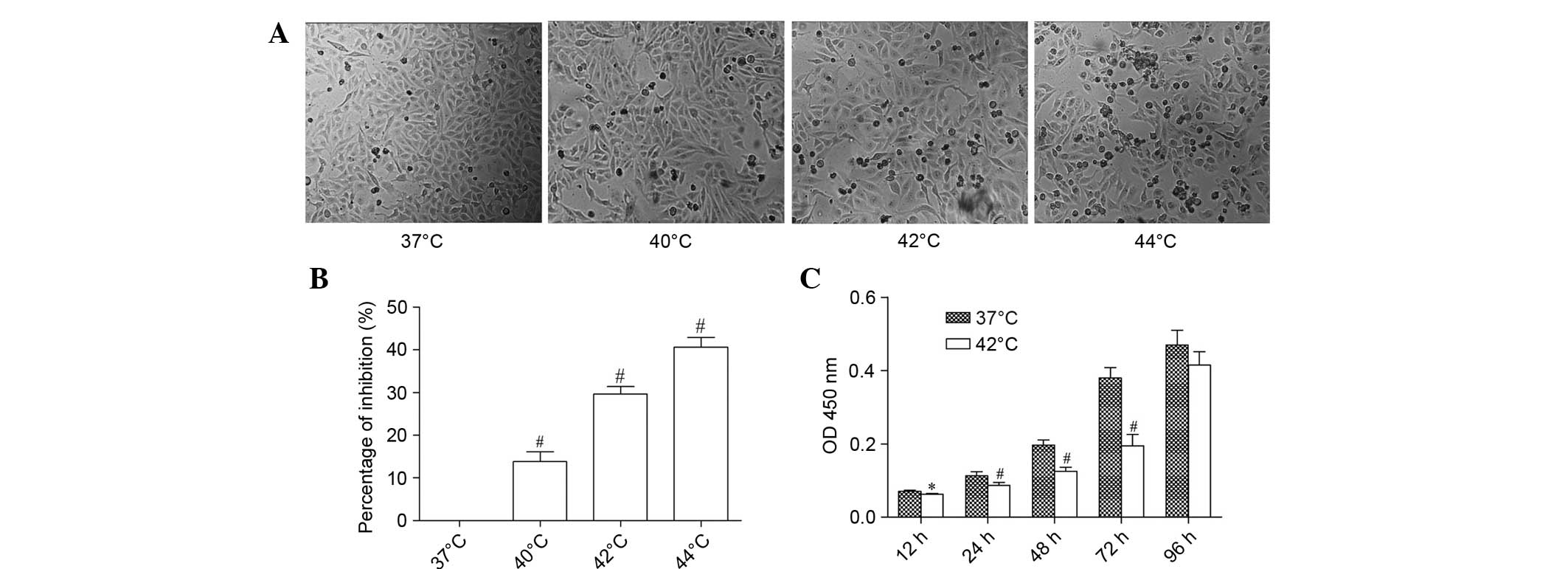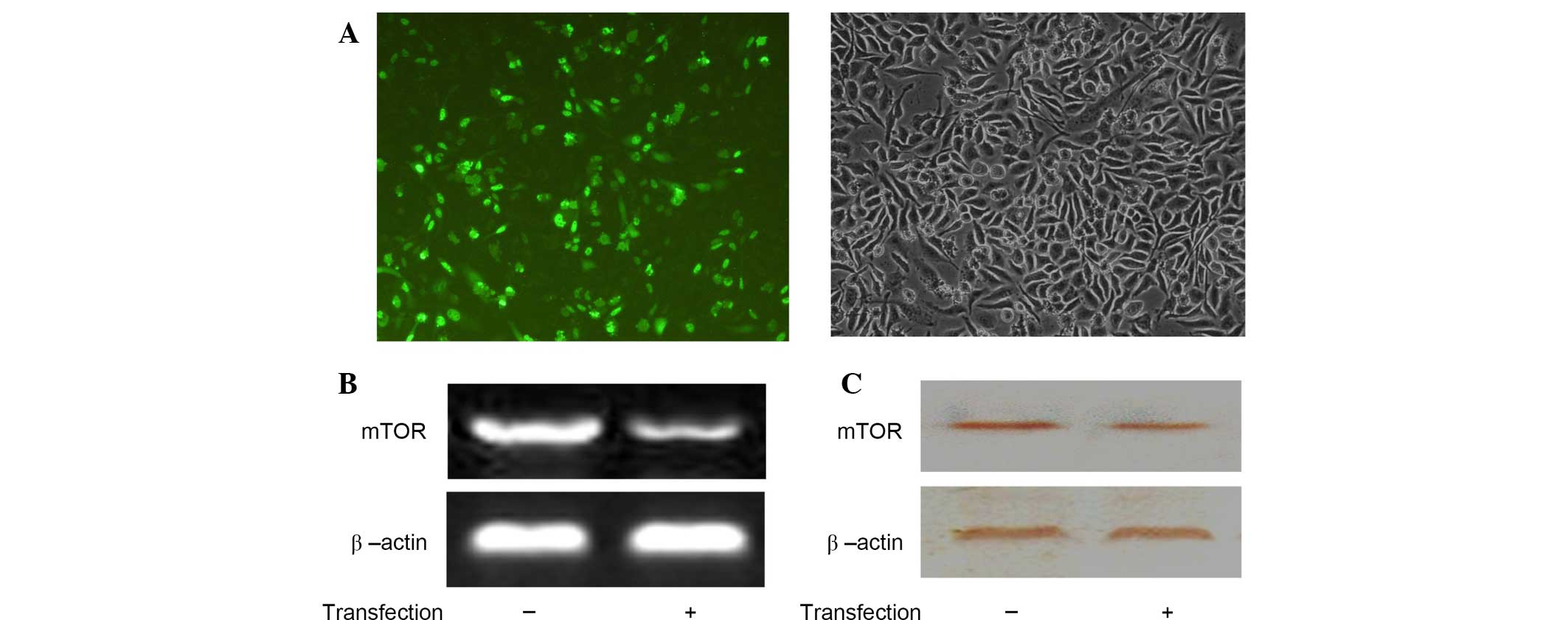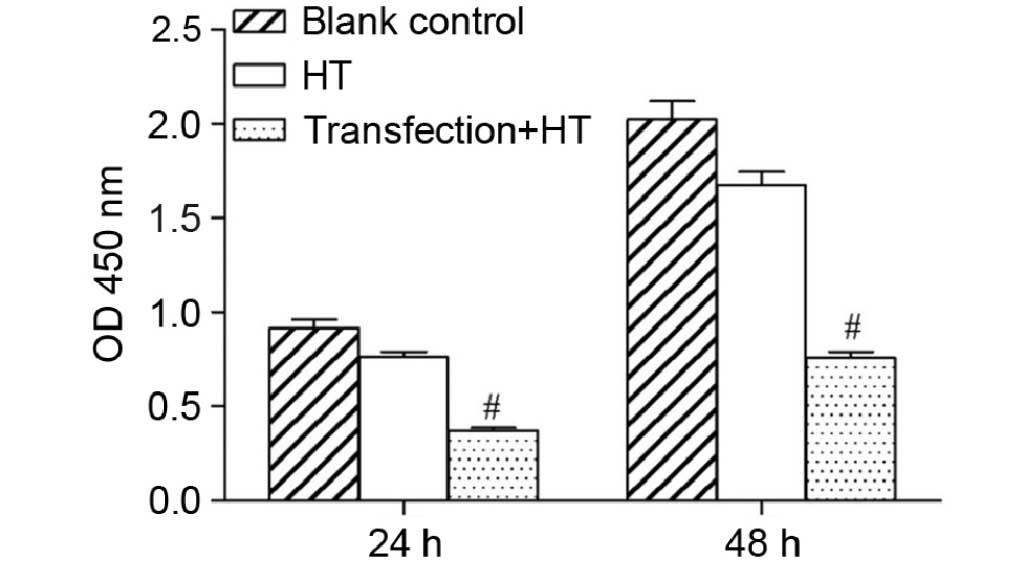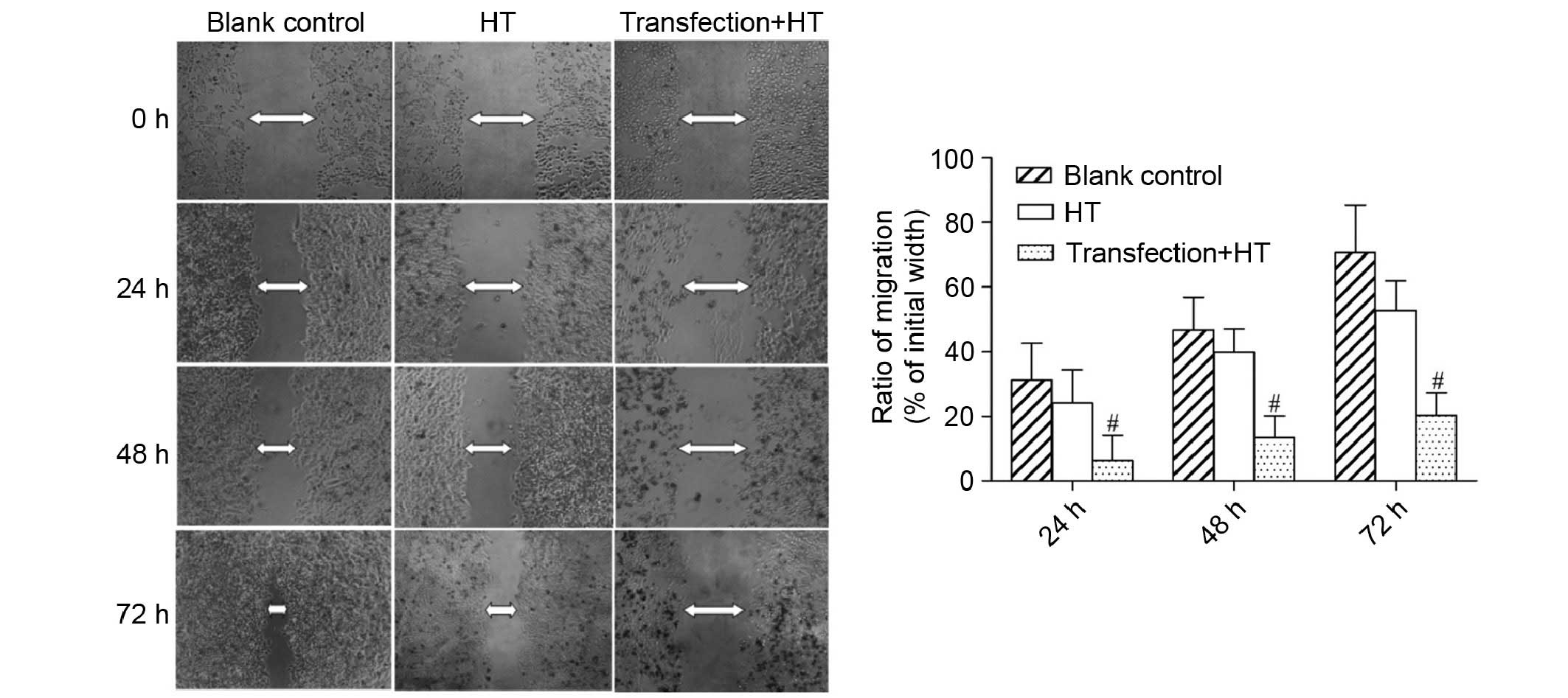|
1
|
Waly RS, Yangde Z and Yuxiang C:
Hepatocellular carcinoma: focus on different aspects of management.
ISRN Oncol. 2012:4216732012.PubMed/NCBI
|
|
2
|
Yang JD and Roberts LR: Epidemiology and
management of hepatocellular carcinoma. Infect Dis Clin North Am.
24:899–919. 2010. View Article : Google Scholar : PubMed/NCBI
|
|
3
|
Roti Roti JL: Cellular responses to
hyperthermia (40-46 degrees C): Cell killing and molecular events.
Int J Hyperthermia. 24:3–15. 2008. View Article : Google Scholar : PubMed/NCBI
|
|
4
|
Habash RW, Bansal R, Krewski D and Alhafid
HT: Thermal therapy, part. 2 hyperthermia techniques. Crit Rev
Biomed Eng. 34:491–542. 2006. View Article : Google Scholar : PubMed/NCBI
|
|
5
|
Mayrhauser U, Stiegler P, Stadlbauer V,
Koestenbauer S, Leber B, Konrad K, Iberer F, Portugaller RH and
Tscheliessnigg K: Effect of hyperthermia on liver cell lines:
Important findings for thermal therapy in hepatocellular carcinoma.
Anticancer Res. 31:1583–1588. 2011.PubMed/NCBI
|
|
6
|
Ahmed K and Zaidi SF: Treating cancer with
heat: Hyperthermia as promising strategy to enhance apoptosis. J
Pak Med Assoc. 63:504–508. 2013.PubMed/NCBI
|
|
7
|
Jansen MC, van Hillegersberg R, Chamuleau
RA, van Delden OM, Gouma DJ and van Gulik TM: Outcome of regional
and local ablative therapies for hepatocellular carcinoma: A
collective review. Eur J Surg Oncol. 31:331–347. 2005. View Article : Google Scholar : PubMed/NCBI
|
|
8
|
Decadt B and Siriwardena AK:
Radiofrequency ablation of liver tumours: systematic review. Lancet
Oncol. 5:550–560. 2004. View Article : Google Scholar : PubMed/NCBI
|
|
9
|
Griffin RJ, Dings RP, Jamshidi-Parsian A
and Song CW: Mild temperature hyperthermia and radiation therapy:
Role of tumour vascular thermotolerance and relevant physiological
factors. Int J Hyperthermia. 26:256–263. 2010. View Article : Google Scholar : PubMed/NCBI
|
|
10
|
Sonna LA, Fujita J, Gaffin SL and Lilly
CM: Invited review: Effects of heat and cold stress on mammalian
gene expression. J Appl Physiol (1985). 92:1725–1742. 2002.
View Article : Google Scholar : PubMed/NCBI
|
|
11
|
Deng H, Ravikumar TS and Yang WL: Bone
morphogenetic protein-4 inhibits heat-induced apoptosis by
modulating MAPK pathways in human colon cancer HCT116 cells. Cancer
Lett. 256:207–217. 2007. View Article : Google Scholar : PubMed/NCBI
|
|
12
|
Ma N, Szmitko P, Brade A, Chu I, Lo A,
Woodgett J, Klamut H and Liu FF: Kinase-dead PKB gene therapy
combined with hyperthermia for human breast cancer. Cancer Gene
Ther. 11:52–60. 2004. View Article : Google Scholar : PubMed/NCBI
|
|
13
|
Buitrago-Molina LE and Vogel A: mTor as a
potential target for the prevention and treatment of hepatocellular
carcinoma. Curr Cancer Drug Targets. 12:1045–1061. 2012. View Article : Google Scholar : PubMed/NCBI
|
|
14
|
Shaw M, Cohen P and Alessi DR: The
activation of protein kinase B by H2O2 or heat shock is mediated by
phosphoinositide 3-kinase and not by mitogen-activated protein
kinase-activated protein kinase-2. Biochem J. 336(Pt 1): 241–246.
1998. View Article : Google Scholar : PubMed/NCBI
|
|
15
|
Soares PI, Ferreira IM, Igreja RA, Novo CM
and Borges JP: Application of hyperthermia for cancer treatment:
recent patents review. Recent Pat Anticancer Drug Discov. 7:64–73.
2012. View Article : Google Scholar : PubMed/NCBI
|
|
16
|
Kouloulias V, Plataniotis G, Kouvaris J,
Dardoufas C, Gennatas C, Uzunoglu N, Papavasiliou C and Vlahos L:
Chemoradiotherapy combined with intracavitary hyperthermia for anal
cancer: Feasibility and long-term results from a phase II
randomized trial. Am J Clin Oncol. 28:91–99. 2005. View Article : Google Scholar : PubMed/NCBI
|
|
17
|
Palazzi M, Maluta S, Dall'Oglio S and
Romano M: The role of hyperthermia in the battle against cancer.
Tumori. 96:902–910. 2010.PubMed/NCBI
|
|
18
|
Armour EP, McEachern D, Wang Z, Corry PM
and Martinez A: Sensitivity of human cells to mild hyperthermia.
Cancer Res. 53:2740–2744. 1993.PubMed/NCBI
|
|
19
|
Hildebrandt B, Wust P, Ahlers O, Dieing A,
Sreenivasa G, Kerner T, Felix R and Riess H: The cellular and
molecular basis of hyperthermia. Crit Rev Oncol Hematol. 43:33–56.
2002. View Article : Google Scholar : PubMed/NCBI
|
|
20
|
Wust P, Hildebrandt B, Sreenivasa G, Rau
B, Gellermann J, Riess H, Felix R and Schlag PM: Hyperthermia in
combined treatment of cancer. Lancet Oncol. 3:487–497. 2002.
View Article : Google Scholar : PubMed/NCBI
|
|
21
|
Gourgou E, Aggeli IK, Beis I and Gaitanaki
C: Hyperthermia-induced Hsp70 and MT20 transcriptional upregulation
are mediated by p38-MAPK and JNKs in Mytilus galloprovincialis
(Lamarck); a pro-survival response. J Exp Biol. 213:347–357. 2010.
View Article : Google Scholar : PubMed/NCBI
|
|
22
|
Georgakis GV and Younes A: From Rapa Nui
to rapamycin: Targeting PI3K/Akt/mTOR for cancer therapy. Expert
Rev Anticancer Ther. 6:131–140. 2006. View Article : Google Scholar : PubMed/NCBI
|
|
23
|
Dudkin L, Dilling MB, Cheshire PJ, Harwood
FC, Hollingshead M, Arbuck SG, Travis R, Sausville EA and Houghton
PJ: Biochemical correlates of mTOR inhibition by the rapamycin
ester CCI-779 and tumor growth inhibition. Clin Cancer Res.
7:1758–1764. 2001.PubMed/NCBI
|
|
24
|
Asano T, Yao Y, Zhu J, Li D, Abbruzzese JL
and Reddy SA: The rapamycin analog CCI-779 is a potent inhibitor of
pancreatic cancer cell proliferation. Biochem Biophys Res Commun.
331:295–302. 2005. View Article : Google Scholar : PubMed/NCBI
|
|
25
|
Atkins MB, Hidalgo M, Stadler WM, Logan
TF, Dutcher JP, Hudes GR, Park Y, Liou SH, Marshall B, Boni JP, et
al: Randomized phase II study of multiple dose levels of CCI-779, a
novel mammalian target of rapamycin kinase inhibitor, in patients
with advanced refractory renal cell carcinoma. J Clin Oncol.
22:909–918. 2004. View Article : Google Scholar : PubMed/NCBI
|
|
26
|
Parent R, Kolippakkam D, Booth G and
Beretta L: Mammalian target of rapamycin activation impairs
hepatocytic differentiation and targets genes moderating lipid
homeostasis and hepatocellular growth. Cancer Res. 67:4337–4345.
2007. View Article : Google Scholar : PubMed/NCBI
|
|
27
|
Schmitz KJ, Wohlschlaeger J, Lang H,
Sotiropoulos GC, Malago M, Steveling K, Reis H, Cicinnati VR,
Schmid KW and Baba HA: Activation of the ERK and AKT signalling
pathway predicts poor prognosis in hepatocellular carcinoma and ERK
activation in cancer tissue is associated with hepatitis C virus
infection. J Hepatol. 48:83–90. 2008. View Article : Google Scholar : PubMed/NCBI
|
|
28
|
Guo Y, Liang X, Lu M, Weng T, Liu Y and Ye
X: Mammalian target of rapamycin as a novel target in the treatment
of hepatocellular carcinoma. Hepatogastroenterology. 57:913–918.
2010.PubMed/NCBI
|
|
29
|
Hui IC, Tung EK, Sze KM, Ching YP and Ng
IO: Rapamycin and CCI-779 inhibit the mammalian target of rapamycin
signalling in hepatocellular carcinoma. Liver Int. 30:65–75. 2010.
View Article : Google Scholar : PubMed/NCBI
|
|
30
|
Ma N, Jin J, Lu F, Woodgett J and Liu FF:
The role of protein kinase B (PKB) in modulating heat sensitivity
in a human breast cancer cell line. Int J Radiat Oncol Biol Phys.
50:1041–1050. 2001. View Article : Google Scholar : PubMed/NCBI
|
|
31
|
Ohnishi K, Yasumoto J, Takahashi A and
Ohnishi T: LY294002, an inhibitor of PI-3 K, enhances heat
sensitivity independently of p53 status in human lung cancer cells.
Int J Oncol. 29:249–253. 2006.PubMed/NCBI
|
|
32
|
Chin YR and Toker A: Function of Akt/PKB
signaling to cell motility, invasion and the tumor stroma in
cancer. Cell Signal. 21:470–476. 2009. View Article : Google Scholar : PubMed/NCBI
|
|
33
|
Zölzer F and Streffer C: Quiescence in
S-phase and G1 arrest induced by irradiation and/or hyperthermia in
six human tumour cell lines of different p53 status. Int J Radiat
Biol. 76:717–725. 2000. View Article : Google Scholar : PubMed/NCBI
|
|
34
|
Ekim B, Magnuson B, Acosta-Jaquez HA,
Keller JA, Feener EP and Fingar DC: mTOR kinase domain
phosphorylation promotes mTORC1 signaling, cell growth, and cell
cycle progression. Mol Cell Biol. 31:2787–2801. 2011. View Article : Google Scholar : PubMed/NCBI
|
|
35
|
Masuda M, Shimomura M, Kobayashi K, Kojima
S and Nakatsura T: Growth inhibition by NVP-BEZ235, a dual
PI3K/mTOR inhibitor, in hepatocellular carcinoma cell lines. Oncol
Rep. 26:1273–1279. 2011.PubMed/NCBI
|




















